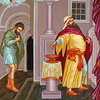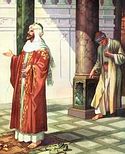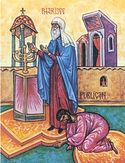

| Previous day | Next day |
| Old Style
January 31
|
Sunday |
New Style
February 13
|
| Sunday of the Publican and the Pharisee. Tone 1. | No fast.
|
![]() Holy Wonderworkers and Unmercenaries Cyrus and John, and Martyrs Athanasia and her daughters Theoctista, Theodota, and Eudoxia, at Canopus in Egypt (311).
Holy Wonderworkers and Unmercenaries Cyrus and John, and Martyrs Athanasia and her daughters Theoctista, Theodota, and Eudoxia, at Canopus in Egypt (311). ![]() St. Nicetas, recluse of the Kiev Caves, bishop of Novgorod (1108).
St. Nicetas, recluse of the Kiev Caves, bishop of Novgorod (1108).
Martyrs Victorinus, Victor, Nicephorus, Claudius, Diodorus, Serapion, and Papias, at Corinth (251). Martyr Tryphaenes, at Cyzicus (1st c.).
St. Marcella of Rome (410). St. Athanasius, bishop of Methone (ca. 880). New Monk-martyr Elias (Ardunis), of Mt. Athos and Kalamata (1686). St. Arsenius the New, of Paros (1877).
Repose of Eugene Poselyanin (Pogozhev), spiritual writer (1931), Elder Codratus of Karakallou, Mt. Athos (1940), and Hieroschemamonk Stephen (Ignatenko) of Kislovodsk (1973).
Thoughts for Each Day of the Year
According to the Daily Church Readings from the Word of God
By St. Theophan the Recluse

Sunday of the Publican and the Pharisee (33rd). [II Tim. 3:10–15; Luke 18:10–14]
Yesterday the Gospel reading taught us persistence in prayer, and now it teaches humility, or a feeling of having no right to be heard. Do not assume that you have the right to be heard, but approach prayer as one unworthy of any attention, allowing yourself only the boldness needed to open your mouth and raise up your prayer to God, knowing the Lord’s boundless condescension toward us poor ones. Do not even allow the thought to come to your mind, “I did such and such—so give me such and such.” Consider whatever you might have done as your obligation. If you had not done it you would have been subject to punishment, and what you did is actually nothing deserving reward; you did not do anything special. That Pharisee enumerated his rights to be heard, and left the church with nothing. The harm is not that he had actually done as he said, for indeed he should have done it. The harm is that he presented it as something special; whereas, having done it he should have thought no more of it. Deliver us, O Lord, from this sin of the Pharisee! One rarely speaks as the Pharisee in words, but in the feelings of the heart, one is rarely unlike him. For why is it that people pray badly? It is because they feel as though they are just fine in the sight of God, even without praying.
Articles
 Wonderworker and Unmercenary CyrusSaint Cyrus was a noted physician in the city of Alexandria, where he had been born and raised. |
 Martyr Athanasia and her daughters at Canopus in EgyptThe Christian woman Athanasia and her three young daughters were arrested because they were Christians. |
 Venerable Nikita of the Kiev Caves, Far Caves the Bishop of NovgorodSaint Nikita, Bishop of Novgorod, in his youth entered the Kiev Caves monastery and soon wished to become a hermit. |
 Martyr Tryphaina at CyzicusThe Holy Martyr Tryphaina came from the city of Cyzicus. She tried to convert the pagans to Christ, and was arrested for this. |
 St. Arsenius of ParosSaint Arsenius was born on January 31, 1800 in Ioannina, Epirus of pious Orthodox parents. In holy Baptism he was given the name Athanasius. |










